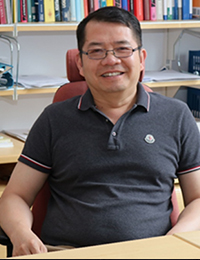Modeling, Control and Optimization of Multi-agent Systems: From Honeybees to Mobile Robots
Speaker: Professor Hu Xiaoming (The Royal Institute of Technology, Sweden)
Time: Wednesday, 15 October, 2025, 10:30a.m. – 11:30 a.m.
Venue: D1b-110, GZIC
Organizer: Shien-Ming Wu School of Intelligent Engineering, Office of Global Affairs, GZIC

Biography:
Hu Xiaoming received his Bachelor's degree from the University of Science and Technology of China in 1983 and his Ph.D. in Philosophy from Arizona State University, USA, in 1989, under the supervision of the renowned nonlinear systems expert Christopher Byrnes. In 1989, he was awarded the Göran Gustafsson Postdoctoral Fellowship by the Royal Institute of Technology (KTH) in Sweden. After 1991, he joined the Department of Mathematics at KTH. In 2003, he was promoted to Full Professor in Optimization and Systems Theory and currently serves as the head of the Optimization and Systems Theory Laboratory. He has previously held positions as the Head of the Division of Optimization and Systems Theory, Deputy Director of the KTH Robotics Center, and Executive Committee Member of the KTH ACCESS Linnaeus Center, as well as a board member of both centers.
Professor Hu Xiaoming has led or participated in numerous research projects funded by the European Union, the Swedish Research Council, the Swedish Foundation for Strategic Research, the Swedish Armed Forces, and the Swedish National Space Agency. He has also been extensively involved in organizing international conferences and serving on editorial boards of international journals. His research focuses on nonlinear feedback control, nonlinear observer design, sensing and active perception, and modeling, analysis, and control of multi-agent systems. He is a prominent scholar actively contributing to the field of international control theory and was honored with the 10th Outstanding Contribution Award by the Technical Committee on Control Theory of the Chinese Association of Automation. To date, he has published over 200 papers and two monographs.
Abstract:
We will try to give a popular science talk on modeling, control and optimization of multi-agent systems. We begin by explaining what a control system is and what a multiagent system is. Then we will give a summary of our research activities and collaboration in multiagent systems. Finally, we will use some cases of study to highlight our research results. We will explain the role of leaders, a game approach to formation, and how to use machine learning to facilitate optimal control for distributed mobile systems.





